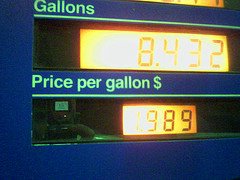Exxon Mobil/Esso sets profit record
 Exxon Mobil/Esso Corp. set U.S. records for annual and quarterly profits Monday as it easily topped fourth-quarter earnings forecasts.
Exxon Mobil/Esso Corp. set U.S. records for annual and quarterly profits Monday as it easily topped fourth-quarter earnings forecasts.US largest oil company reported net income in the fourth quarter of $10.7 billion, or $1.71 a share, compared to $8.4 billion, or $1.30 a share, a year earlier.
Excluding items, Exxon Mobil/Esso earned $10.3 billion, or $1.65 per share, topping a consensus forecast of $1.44 a share from analysts surveyed by earnings tracker First Call. It also topped the record for quarterly profits it set in the third quarter, when it earned $9.9 billion.
Shares of Exxon MobilEsso gained 2 percent in early-afternoon trading, helping to take the Dow into positive territory.
For the year the company earned net income of $36.1 billion, or $33.9 billion excluding special items. That's up 31 percent from the $25.9 billion it earned on that basis year earlier.
Exxon Mobil's 2005 net income for the year comes to $1,146 a second. That per-second profit is enough to pay for gas for the average American vehicle to be driven 10,294 miles, at current gasoline prices.
While oil and gasoline prices in the fourth quarter were down from the levels seen in September, that barely dented Exxon Mobil's top line. Revenue for the quarter was $99.7 billion, up from $81.9 billion in the year-earlier quarter, and down only 1 percent from the $100.7 billion in revenue in the third quarter. Full-year revenue came to $371 billion, or just over $1 billion a day.
The Exxon Mobil earnings statement was almost defensive about the record profit.
"There is a great deal of public interest in global energy prices," said a statement attributed to Exxon Mobil Chairman Rex Tillerson. "We recognize that consumers worldwide want and need reliable supplies of affordable energy -- to fuel their vehicles, light and heat their homes and run their businesses. Our strong financial results will continue to allow us to make significant, long-term investments required to do our part in meeting the world's energy needs."
Henry Hubble, Exxon Mobil's vice president of investor relations, told analysts and investors during a conference call that the company had returned about $23 billion to shareholders in 2005 through dividends and share repurchases. The company raised its dividend to 32 cents in the first quarter from 29 cents in the fourth quarter. The company has increased its dividend for 29 consecutive years.
"Our earnings reflect our ability to capture the strong industry condition. More importantly they highlight the things we do exceptionally well," Hubble said, detailing work to deliver strong operating margins and its investment strategy.
Fadel Gheit, oil analyst with Oppenheimer, said the company beat expectations by recovering faster than expected from the hurricanes that hit the Gulf Coast near the end of the third quarter and by posting strong margins in its refining and marketing units, the side of the oil business that can often be squeezed by higher oil prices.
Despite the company record cash flow and a strong cash position on its balance sheet, he doubts the company will use any of its wealth to buy other companies as some competitors have done. Company officials have said they don't want to buy oil assets at current prices but Gheit said he thinks there are also political reasons behind their reluctance.
"That would invite unnecessary and unwanted scrutiny of Exxon," he said.
As to the Exxon Mobil's earnings record, First Call could not definitively say what was the largest annual profit on record. But it appears the previous mark was held by Media One, the cable television operator that eventually became part of Comcast. It posted net income of $26.3 billion in 1998.
But most of that profit came from accounting of a split between cable and telephone units that took place over the year. Media One's income from continuing operations that year came to only $1.4 billion.
The largest operating income before this year may well have been Exxon Mobil's $25.9 billion in 2004.
Of course Exxon Mobil isn't the only oil company reporting sharply better results. The 12 U.S. oil companies in the S&P 500 that have reported fourth-quarter results have seen an average of a 48 percent rise in earnings excluding items in the period, according to First Call.
The list includes most of the large U.S. oil companies, including No. 2 Chevron and No. 3 ConocoPhillips. But it does not include major foreign-based oil companies such as Royal Dutch Shell or BP, which both have extensive U.S. operations.
The oil companies in the S&P are expected to see full-year earnings of $96.5 billion, when combining reported results and forecasts for the companies yet to report. That also would be up 48 percent from a year ago. And the profit growth is not nearing an end, with analysts surveyed by First Call looking for 15 percent growth in earnings at those companies in 2006.
Strong oil earnings in the third quarter prompted calls in some quarters of Congress for a so-called "windfall profit" tax on oil company earnings, as well as a joint hearing of the Senate Energy and Commerce committees into earnings from big oil. Lee Raymond, who retired as Chairman and CEO of Exxon Mobil in December, was one of five executives from big oil called to testify.
The various windfall profit tax proposal by Sen. Byron Dorgan, D-N.D., failed on when offered as an amendment in the Senate in the fall. Gheit said he doesn't believe that there will be much revival of the talk of a windfall profit tax now despite the new record profit.
"People don't look at oil profits, they look at prices at the pump," he said.
The average price of a gallon of unleaded regular gasoline retreated from the post-Hurricane Katrina record high of $3.057. But after oil and gasoline prices are rising again, with the AAA average showing a nearly 7 percent gain over the last month.
Sheraz Mian, oil analyst for Zack's, agreed the lower gasoline has reduced the pressure for a tax on oil companies, but he's not convinced the companies are out of the woods yet.
"I would not completely rule out noise on this in the next few weeks," he said. He agreed with analysts who see even higher oil profits ahead in 2006. Both he and Gheit have a buy recommendation on Exxon Mobil shares, with Mian having a $70 a share target price.
"We don't see '05 as the peak. We believe '06,for now, looks to be better," he said.
CNN







